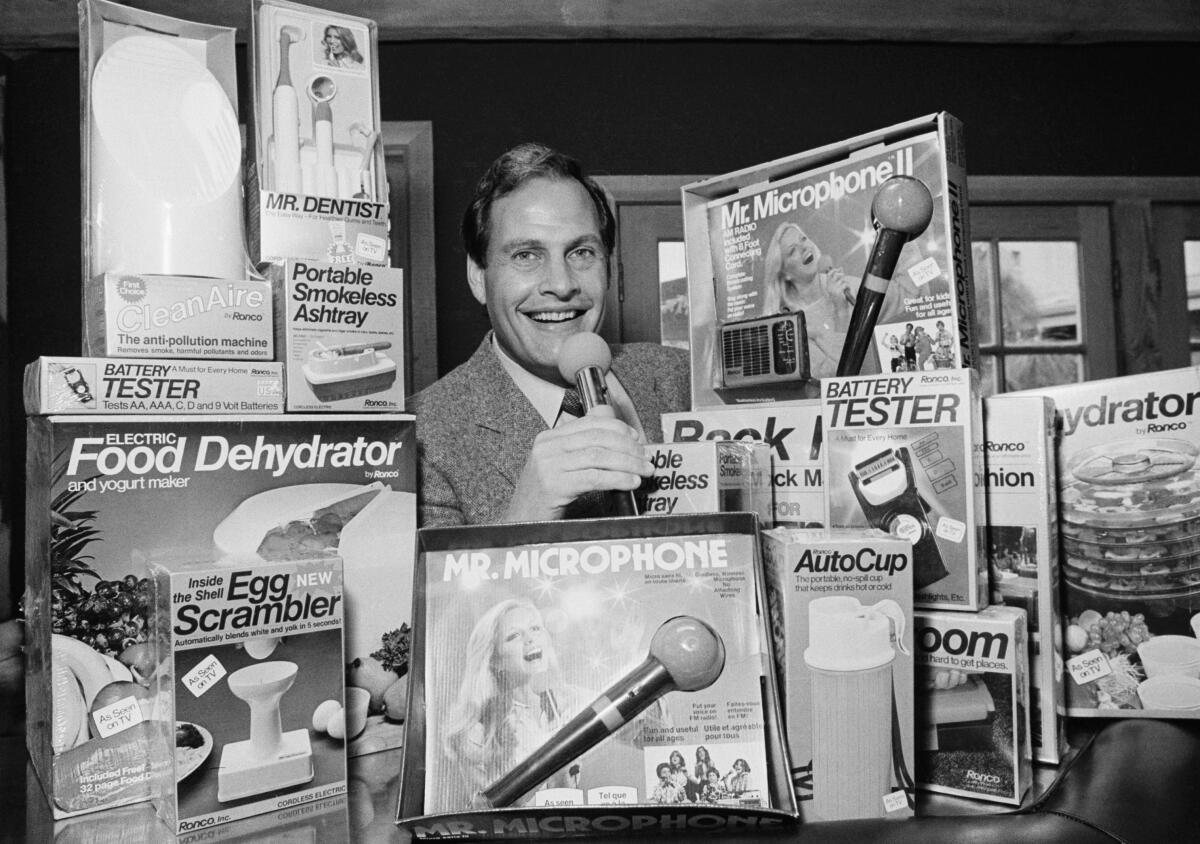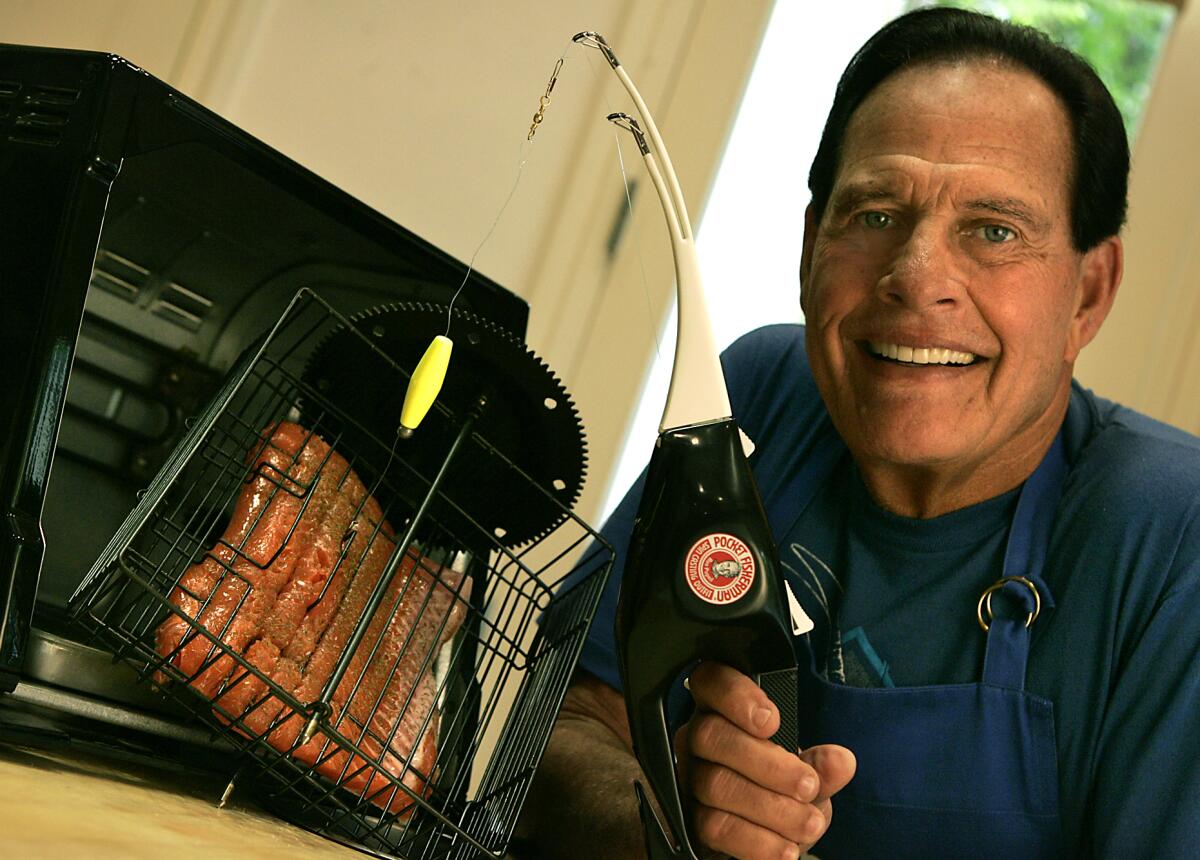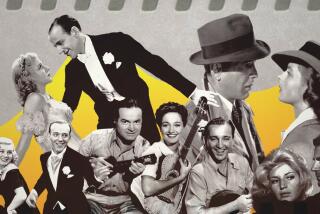How Ron Popeil perfected the art of the infomercial

- Share via
“It chops, it dices, it slices/ It never stops/ Lasts a lifetime, it mows your lawn…/ It picks up the kids from school/ It gets rid of unwanted facial hair/ It gets rid of embarrassing age spots/ It delivers the pizza.” —“Step Right Up,” Tom Waits, 1976
Ron Popeil — sometimes called, in the course of a Ron Popeil infomercial, “America’s Salesman” — died last month at age 86. It was sudden, said his family, and peaceful.
In addition to being a pitchman, Popeil was an inventor. It is possible you have used one of his gadgets or gizmos or appliances and unlikely you have never heard of any of the products with which his name is associated. (He did not invent everything he sold.) The Veg-o-Matic. Mr. Microphone. The Showtime Rotisserie and BBQ. Hair in a spray can.
The complete guide to home viewing
Get Screen Gab for everything about the TV shows and streaming movies everyone’s talking about.
You may occasionally receive promotional content from the Los Angeles Times.
“As seen on TV” is a phrase prominently attached to these and many non-Popeil products — your Chia Pets, your ShamWows, your George Foreman Grills — because where better to be seen than on television? But it applies to Popeil himself as well, as much a TV star as Mr. T or Mary Tyler Moore, if one whose appearances took place largely late at night or on Sunday morning. His products were parodied on “Saturday Night Live” (Dan Aykroyd’s famous “Bass-o-matic” sketch, Eddie Murphy’s less famous “Popeil Galactic Prophylactic”); his praises were sung by Weird Al Yankovic; he was a head in a jar on “Futurama” and made sundry cameo and talk show appearances. Without television, Popeil would have been a name on a box; with television, he was Thomas Edison.
Popeil, who cut his teeth pitching among the seasoned hawkers of Chicago’s Maxwell Street open air market, at state fairs and at Woolworth’s — where he drew a faithful lunch crowd, like the Beatles at the Cavern Club — first appeared on television in 1956, demonstrating the Chop-o-Matic, invented by his father, Samuel J. Popeil. (It was Samuel who devised the Pocket Fisherman and Veg-o-Matic. Ron’s own inventing days came later, after he left Popeil Brothers and founded Ronco.) A clip exists: Ron is barely into his 20s, clean-cut, good-looking, just stiff enough to seem genuine. Wearing a lab coat for scientific credibility, he’s energetic but smooth — “Ladies and gentlemen, I’m going to show you the greatest kitchen appliance ever made. ... All your onions chopped to perfection without shedding a single tear.” In contrast to the late Billy Mays, “America’s Pitchman,” who sold OxiClean and Mighty Putty as if attempting to be heard in a wind tunnel, Popeil spoke at the volume, and rather in the style of, a stage magazine — cheerful, lulling, a little bit funny.
Ron Popeil, the legendary pitchman and father of the infomercial, has died at 86.
And, indeed, there is a kind of legerdemain involved in these presentations; you can’t always be sure whether you’re watching a superior product or a superior user of the product (your mileage may vary). When Popeil hit the glass door of a Showtime Rotisserie with a hammer to demonstrate its strength, saying, “I make a product that’s good,” he added, as an aside, “Now I don’t suggest you do that at home.” In other words, you could break the glass. At the same time, there’s no one more honest than a magician: The whole point of magic is that it isn’t actually magic; that’s what makes it amazing. There’s something admirably straightforward about its smoke and mirrors, something familiar, something that might almost be called sincere.
The expensive psychological warfare conducted by corporations and advertising hives against consumers — big-time TV commercials, I mean — is 95 percent metaphor, suggesting by association that merely to own or consume such and such an item will make you a more manly man, a more womanly woman, a smarter parent, a friendlier friend, or a person who doesn’t need friends because you have a great big truck. Some ads don’t even mention the product until the very end, perhaps just flashing a logo. The infomercial, on the other hand — like the door-to-door vacuum salesman who sprinkles dirt on your living room rug in order to suck it up — shines a spotlight on the product, describes it again and again, shows you how easy it is to use and how marvelous are its results.

Younger readers may be surprised to learn that there was a time when television didn’t run around the clock and that between the national anthem that concluded and the test pattern that preceded the broadcast day, static reigned on many stations. This was the dirt-cheap territory colonized by infomercials when deregulation, in the 1980s, made it possible to run commercials unobstructed by actual, you know, shows. If you were up late with the urge to watch television in the dark ages before DVD and VOD and 10,000 cable channels, infomercials might have been your only, or at any rate most tempting, option. (Eccentric televangelists like Gene Scott also bought time there — another sort of pitchman.) You could watch them with ironic amusement, sociological interest, or the simple desire to be entertained or seduced or just spoken to; no matter how many people might have been watching at any given time, the salesman was talking to you. It was your finger on the phone that mattered.
That sales is a game in which the salesman employs psychology to gain an unequal advantage is no secret; there are any number of books on the subject, including Popeil’s own “The Salesman of the Century: Inventing, Marketing, and Selling on TV : How I Did It and How You Can Too!” Nevertheless, Popeil believed in his products, some of which he created to satisfy a personal desire. (His favorite, the Inside the Shell Egg Scrambler, came about because he was disgusted by any trace of egg whites in his scramble.) There is an evangelical streak to selling; it is the buyer who is being saved — from drudgery, drabness, decay — by being offered such a wonderful product, at a discount that was always the real price, with free extras already figured into the tab.
As befits a business whose competitors wanted to advertise themselves as the first, the best or the only, its history is subject to competing claims. The line “But wait, there’s more,” often connected to Popeil, was the invention of copywriter Arthur Schiff, the man who rechristened an Ohio-made blade as the Ginsu knife. And although Popeil’s website credits him with creating the first infomercial, his “Chop-o-Matic” spot was preceded by several years by William G. Barnard’s oratorical pitch for the Vitamix blender, shot in 1949 and first aired the following year. You can see it online in its highly enjoyable half-hour entirety, and apart from the lack of a studio audience, its stentorian tone and frequent invocations of the “God of Heaven” — “the great chemist of the universe” whose gifts you insult when you throw away the nutritious skin of your fruits and vegetables — the elements of the modern infomercial are in place: the studio set made to look like a kitchen, the demonstration, the free extras, the bonus if you call now, the guarantee.
Eventually, the FCC would limit commercial time, resulting in ads for such Popeil/Ronco classics as Mr. Microphone, the Pocket Fisherman and the Veg-o-Matic that were ordinary television commercials packed with information, illustrative vignettes, demonstrations, special offers and buying instructions, all delivered as quickly as possible, like a street corner hawker trying to finish a spiel before the cops arrive. Sometimes the voice was Popeil’s. Or he might appear unidentified on camera to sell you a Smokeless Ashtray: “If you smoke, buy one to be considerate of those who don’t smoke; if you don’t smoke, buy one for your friends who do.” One is never enough.
Writer-director Mike White and his cast reveal how HBO’s limited series unearthed the ‘apocalyptic anxiety’ beneath the surface of luxury tourism.
When time limits were lifted in the deregulating 1980s, Popeil slid naturally into long-form commercials — closer, after all, to how he’d worked at fairs and Woolworth’s and on Maxwell Street — not just a salesman, but a showman. He became a celebrity, a man with fans who identified him with his products and knew to say “And forget it!” when Popeil said “Set it!” Selling the Showtime Rotisserie or Ronco Six Star Plus Knives or Ronco Food Dehydrator from a replica of his kitchen, he might welcome the presence of one of his daughters or his Cousin Arnold, slicing a pineapple in two like some highly skilled fruit executioner. Popeil liked a foil, someone he could chatter at while he skewered a chicken. And when 24-hour shopping channels came in, he was there too, guest-selling on QVC; he once sold $1 million worth of rotisseries in an hour.
Even if you aren’t in the market for a rotisserie or a youth serum, infomercials can be enticing. The most sales-resistant person might start wondering whether there isn’t something to it — something about one’s skin, one’s scalp, one’s pet-stained carpet that’s been standing in the way of a full and enriching life. One might wonder why one hasn’t changed the channel. (The mere act of shopping — not even buying — has been demonstrated to stimulate the production of dopamine. It’s literally a drug.)
There must be some significant intersection of people who are up in the middle of the night and people who feel they need a change. Because, apart from the stuff, what’s on sale here is possibility, potential: the dream of time, the dream of youth, the dream of a potato perfectly sliced in seconds. This could be the first gadget of the rest of your life. Maybe if you buy two and give one to a friend, you’ll by definition have a friend. Love, people, it’s just three easy payments away. In this place, everything starts with a question — “Tired of the same old?” “Has this ever happened to you?” — and ends with a solution or your money back. Operators are standing by.
More to Read
The complete guide to home viewing
Get Screen Gab for everything about the TV shows and streaming movies everyone’s talking about.
You may occasionally receive promotional content from the Los Angeles Times.








